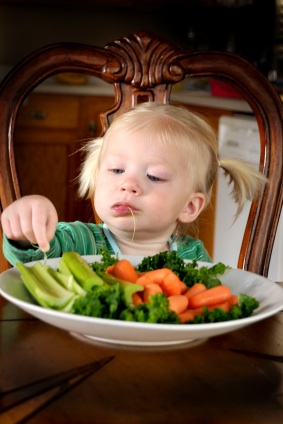Children attend nursery at an age where nutrition is vital for development. Preschool children need more nutrients in proportion to their body weight, they are going through a stage of rapid bone and brain development and nutrient intake needs to be adequate to support this process. Good nutrition not only aids development and gives children the energy they need but also has further reaching long-term health benefits.
Recent research from governing body Ofsted found that 65% of day care providers were serving good or outstanding food. Inspectors discovered that most nurseries place a strong emphasis on home cooked food with a cook on site who uses fresh ingredients and low levels of salt, sugar and fat. However, a small minority continues to offer sweets, crisps and biscuits.
“Some places were steaming ahead – usually due to a motivated individual or group at the local level – while others were a long way behind.”
Nutrition in nurseries
Julie Armstrong, public health nutritionist, is part of a Scottish team who has just conducted a study into nutrition in nurseries. Alarmed by their findings they produced a consultation document, Nutritional Guidelines for Early Years, which aims to encourage more fruit and vegetables, less junk food and fewer snacks and sweets. “What we found were huge inequalities in the provision of food in nurseries,“ Armstrong explains. “Some places were steaming ahead – usually due to a motivated individual or group at the local level – while others were a long way behind. Where quality was bad, it was very bad – children were being fed completely processed rubbish.”

Homecooked ideas
Luckily for parents in Windsor, Berkshire, one such motivated individual has set up a nursery run as a family business, that serves organic homecooked food. Linsey Lunny started Little Monkeys with her mother, a chef, in 2005. “Taking care of children at such an important stage in their lives, we felt it important to provide the best quality food available; organic food is free from pesticides and chemicals that could potentially affect their health.“ Much of the food served to children here is locally sourced to reduce the nursery’s carbon footprint and because Lunny likes to support other local businesses. Sited next to an allotment and with its own vegetable garden tended by the children, Little Monkeys offers a well-rounded approach to food. An approach that was to gain them a Nursery Food Award last year.
Importance of organics
Lizzie Vann, founder of children’s food company Organix, set up the Nursery Food Awards in 2007. Aiming to champion those nurseries that provide fresh, healthy, local and organic foods, she says, “We launched these awards to inspire nurseries to look at the health of children in their care, especially the food that they eat whilst at nursery.“ Vann believes that feeding children an organic diet is important not just for their daily wellbeing but also for long-term growth and development. “Organic foods can contain higher levels of vitamin C and essential minerals such as calcium, magnesium, iron and chromium as well as cancer-fighting antioxidants.”
The 2009 Nursery Food Awards will be held in November and entrants are expected to meet a set of criteria including serving little or no processed food, involving children in food preparation, sourcing local, organic and seasonal produce and providing a good eating environment for the children.
“Although herbicides and pesticides may prove to be completely harmless, why take the risk if there is an alternative?”
Involving children
Getting children involved and providing a nurturing space in which to eat is key to the success of a daycare centre in Skipton, North Yorkshire. Seventeen years ago Caroline Midgeley started the Embsay Children’s Centre to provide a home-from-home environment for her own young children and their peers. The centre is surrounded by fields and a paddock, which is home to the centre’s pets, a pony, sheep, hens and ducks. Catering for children aged two upwards, with an after school club, two meals are served each day from a wide ranging menu including salmon in white sauce and Spaghetti Bolognese. Midgley, an agricultural botanist by trade, chooses organic food for the children in her care. “It is often difficult to tell if synthetic chemicals are harmful or not. Pesticides that have been widely used are commonly taken off the market or restricted in use, due to new findings. Although herbicides and pesticides may prove to be completely harmless, why take the risk if there is an alternative?”
Health benefits
In Greens Norton, Northants, Eileen and John Cotts Tegg both feel passionately about organic food and the benefits to overall health. They founded Hedgehog Hill, the first nursery to fully embrace the organic concept and they have established an ‘organic curriculum’. “As well as serving organic food, we realized that we could encompass using environmentally friendly products and teaching children about green issues through organic gardening and caring for the planet,” says Eileen. “We hope that what children learn at Hedgehog Hill will stay with them for life and we are working hard to provide a model nursery school which can be copied by others to promote healthier lifestyles.” Preschoolers can expect lessons in music, yoga French and organic gardening. The school teaches an early respect for the environment with initiatives such as a walking bus, a car sharing scheme and public transport vouchers for staff.
Positive Impact
Director of the first Soil Association certified nursery, Kimberley Foster explains that she set up First Learning in Middlesex four years ago in a drive to encourage parents to consider the positive impact that organic food has on children’s health and wellbeing. Although she met with initial scepticism about the cost of providing solely organic food, Foster was determined to make it work. “At first our ideas fell on stony ground; we were met with responses like ‘organic? oh no, that would push fees up‘ She ploughed on and today the food served is guaranteed to be free from genetically modified ingredients, artificial additives, preservatives, flavourings, colourings, sweeteners or enhancers and pesticides and the parents are very supportive. The school is rigorously checked by the Soil Association to make sure that they meet all the requirements. Foster believes that all food should be organic and hopes that one day it will be. She says, “Young children have largely undeveloped immune systems and the potential damage which the cocktail of chemicals currently used in the growing and processing of most non-organic foods cannot be quantified.“
The fact that these places are thriving around the country today is a testament to the pioneering men and women behind them, and their belief in good food for our children. Hopefully their passion will inspire others to follow in their footsteps. We’re planning an article about forest nursery schools – check back soon. In the meantime, tell us about your family’s experiences of nursery and school meal provision – good, bad or ugly?







